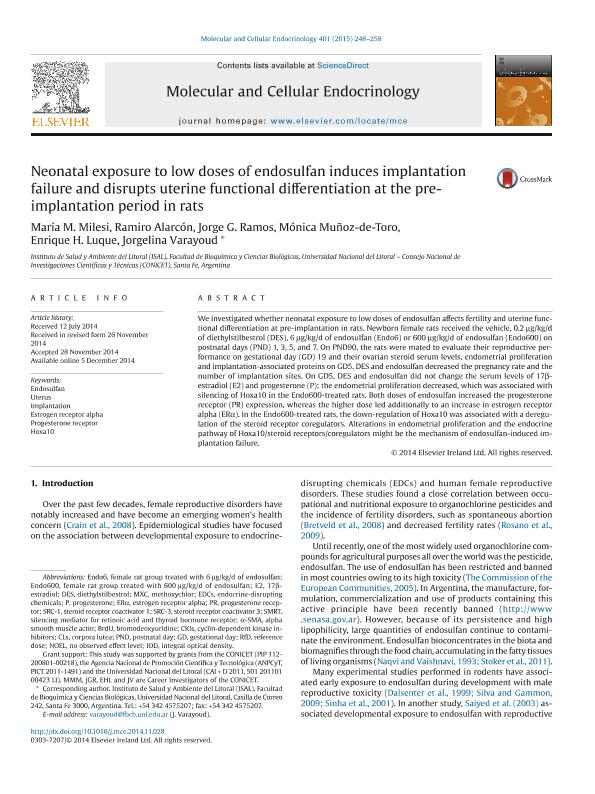Artículo
Neonatal exposure to low doses of endosulfan induces implantation failure and disrupts uterine functional differentiation at the pre-implantation period in rats
Milesi, Maria Mercedes ; Alarcón, Ramiro
; Alarcón, Ramiro ; Ramos, Jorge Guillermo
; Ramos, Jorge Guillermo ; Muñoz de Toro, Monica Milagros; Luque, Enrique Hugo
; Muñoz de Toro, Monica Milagros; Luque, Enrique Hugo ; Varayoud, Jorgelina Guadalupe
; Varayoud, Jorgelina Guadalupe
 ; Alarcón, Ramiro
; Alarcón, Ramiro ; Ramos, Jorge Guillermo
; Ramos, Jorge Guillermo ; Muñoz de Toro, Monica Milagros; Luque, Enrique Hugo
; Muñoz de Toro, Monica Milagros; Luque, Enrique Hugo ; Varayoud, Jorgelina Guadalupe
; Varayoud, Jorgelina Guadalupe
Fecha de publicación:
02/2015
Editorial:
Elsevier Ireland
Revista:
Molecular and Cellular Endocrinology
ISSN:
0303-7207
Idioma:
Inglés
Tipo de recurso:
Artículo publicado
Clasificación temática:
Resumen
We investigated whether neonatal exposure to low doses of endosulfan affects fertility and uterine functional differentiation at pre-implantation in rats. Newborn female rats received the vehicle, 0.2 μg/kg/d of diethylstilbestrol (DES), 6 μg/kg/d of endosulfan (Endo6) or 600 μg/kg/d of endosulfan (Endo600) on postnatal days (PND) 1, 3, 5, and 7. On PND90, the rats were mated to evaluate their reproductive performance on gestational day (GD) 19 and their ovarian steroid serum levels, endometrial proliferation and implantation-associated proteins on GD5. DES and endosulfan decreased the pregnancy rate and the number of implantation sites. On GD5, DES and endosulfan did not change the serum levels of 17β-estradiol (E2) and progesterone (P); the endometrial proliferation decreased, which was associated with silencing of Hoxa10 in the Endo600-treated rats. Both doses of endosulfan increased the progesterone receptor (PR) expression, whereas the higher dose led additionally to an increase in estrogen receptor alpha (ERα). In the Endo600-treated rats, the down-regulation of Hoxa10 was associated with a deregulation of the steroid receptor coregulators. Alterations in endometrial proliferation and the endocrine pathway of Hoxa10/steroid receptors/coregulators might be the mechanism of endosulfan-induced implantation failure.
Archivos asociados
Licencia
Identificadores
Colecciones
Articulos(CCT - SANTA FE)
Articulos de CTRO.CIENTIFICO TECNOL.CONICET - SANTA FE
Articulos de CTRO.CIENTIFICO TECNOL.CONICET - SANTA FE
Articulos(ISAL)
Articulos de INSTITUTO DE SALUD Y AMBIENTE DEL LITORAL
Articulos de INSTITUTO DE SALUD Y AMBIENTE DEL LITORAL
Citación
Milesi, Maria Mercedes; Alarcón, Ramiro; Ramos, Jorge Guillermo; Muñoz de Toro, Monica Milagros; Luque, Enrique Hugo; et al.; Neonatal exposure to low doses of endosulfan induces implantation failure and disrupts uterine functional differentiation at the pre-implantation period in rats; Elsevier Ireland; Molecular and Cellular Endocrinology; 401; 2-2015; 248-259
Compartir
Altmétricas



